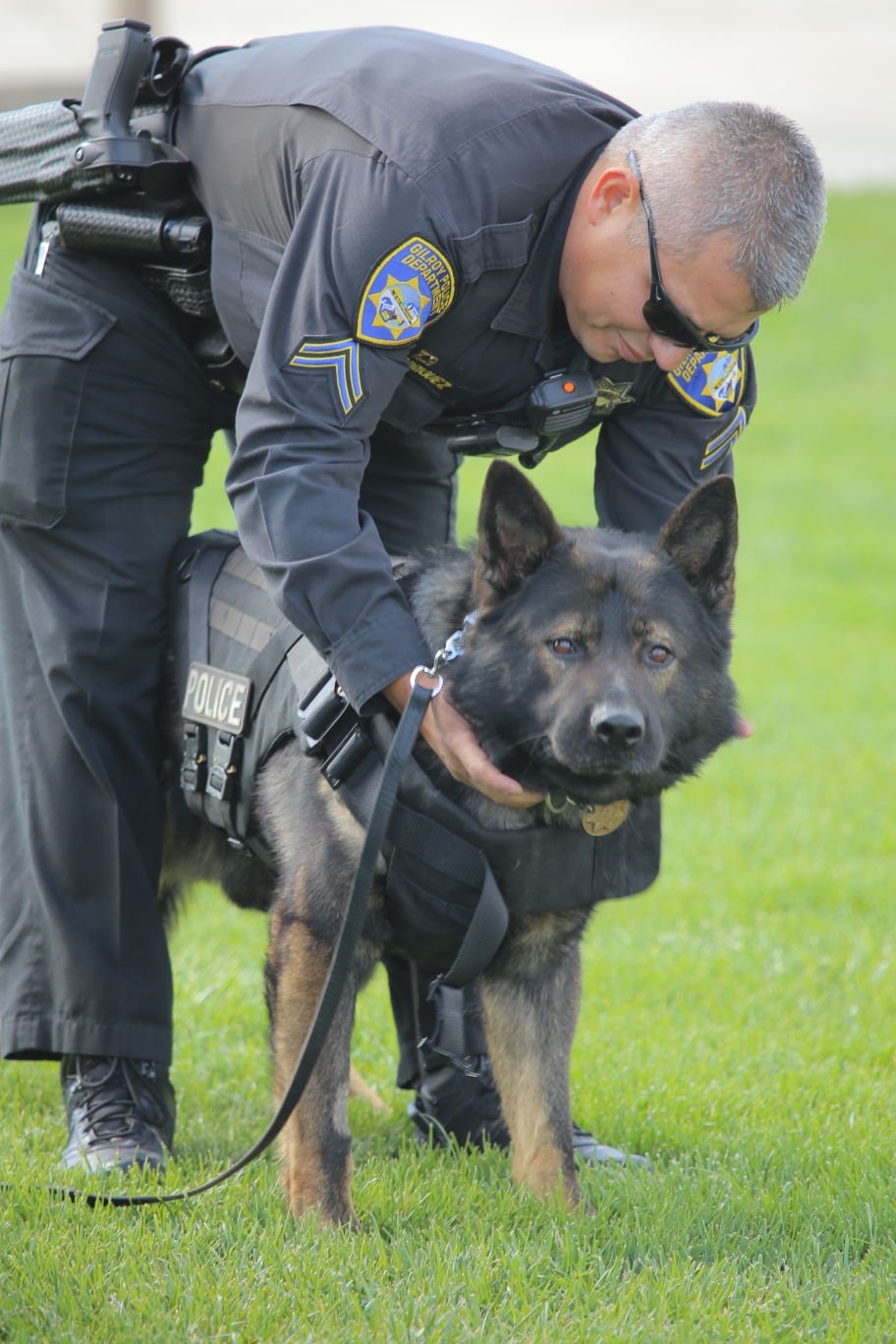
GILROY—When Pharaoh and Twister hear their owners in distress, they’re ready to rush to their aid without hesitation. The 3-year-old German Shepherds, K9 officers with the Gilroy Police Department, race towards danger regardless of the odds and often risk their lives doing so.
The two veterans of the force who raised the animals from puppies and patrol Gilroy’s streets together can breathe easier, knowing the canines now are safer from stabs, bullets and injuries thanks to a new, fitted protective vest donated by the Gilroy Foundation.
Protective vests for police dogs must be individually fitted so as to not restrict the animals’ movement or speed, making them expensive. But it’s a cost worth bearing to protect the canines that help keep the community safe, Gilroy Foundation Executive Director Donna Pray told the Dispatch.
“Dogs can do it all. They can make you happy and make you smile, and they can protect us,” Pray said. “They love us and we need to love them back.”
Pray, her husband and four adult children, discussed how best to help animals with their donor-advised fund during Christmas and thought it was a “no brainer” to buy a vest.
In a month or so, the Pray family’s donation also will pay for installation of two automated cooling systems—one for each K9 patrol car—that will keep the animals comfortable during the summer whether the car engine is on or off.
“We want them to travel with the officers and be kept safe and comfortable in the back seat so they’re ready to serve at a moment’s notice,” Pray added.
GPD Cpl. Paco Rodriguez, Pharaoh’s handler and a 13-year veteran of the department, spends nearly every moment with his dog—whether he’s patrolling or relaxing at home.
He first set eyes on Pharaoh when the dog was 14-months-old, an import straight from Europe. One month later, Pharaoh was patrolling Gilroy’s streets and he’s now trained in drug detection and the apprehension of suspects and recently completed a class that honed his tracking skills.
“We start training them young because it makes it easier to get that bond,” Rodriguez said. “You need a strong bond between the dog and the handler so he wants to please you. He has to want to work for you.”
And just like training any other dog—or raising children, as Rodriguez points out—rewards must be built in. If the K9 finds a mother lode of hidden drugs during a traffic stop, for example, Pharaoh gets to play with his favorite chew toy.
“It almost makes you feel bad when he finds a big amount of drugs and all he wants is a little toy. That’s all he wants,” the police corporal said with a laugh. Pharaoh has recovered approximately 15 pounds of cocaine, seven pounds of heroin and “a bunch” of methamphetamine over the years, he added.
Twister, the K9 unit’s newest addition, recently received training to make him qualified to be a SWAT dog, according to his handler Officer Jesus Contreras, a 12-year veteran of the GPD.
“Obviously, the dog has better senses than the robot (we send in to clear a home during SWAT operations),” Contreras said.
While Pharaoh already had a vest thanks to a donation from the Gilroy Foundation years ago and the support of organizations that seek to protect K9s nationwide, Twister didn’t.
The fitted vest now offers protection for the animal’s vital areas. While no vest offers 100-percent protection, it can stop most handgun rounds and block a blow from a knife.
“The stab protection is big because a lot of K9 dogs across the country get injured that way,” Rodriguez said. “If he gets hurt in other areas, it can be bad but it won’t be as bad as a punctured lung.”
Demonstrating how the vests allow the animals full mobility, Rodriguez and Contreras took turns tossing toys to their partners at the Gilroy Sports Park Wednesday.
At one point, Rodriguez hid Pharaoh’s favorite ball behind his back and asked him to speak. With each bark, the police corporal smiled as he praised his companion.
Rodriguez said it’s an incredible feeling knowing he has Pharaoh in the back seat when he’s out on patrol, ready to obey his commands and defend him. But the feeling is mutual, he said.
“There have been a couple of times where he’s been sick with an ear infection and I feel awkward without him. I feel like I’m missing something because he’s not there,” said Rodriguez.
“It’s that extra sense of security,” Contreras said.
“They are willing to put their lives on the line without thinking about it. They’ll just do it, ” Rodriguez continued. “I feel the same for him and I’ll do whatever I need to do to keep him safe.”












